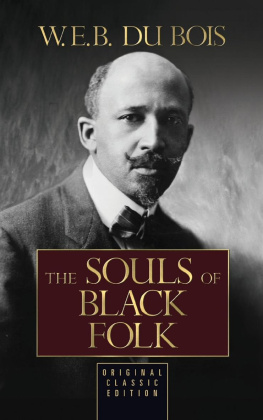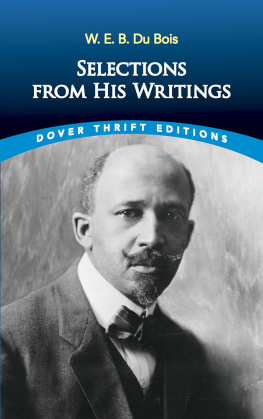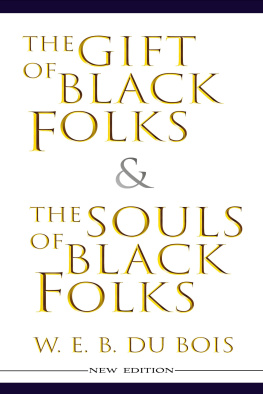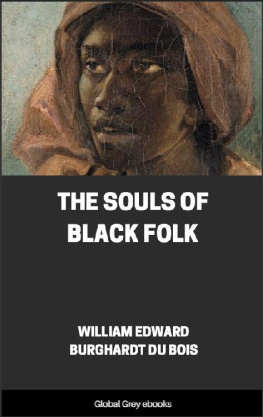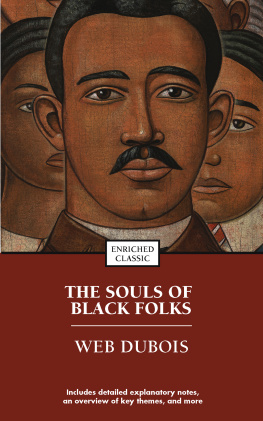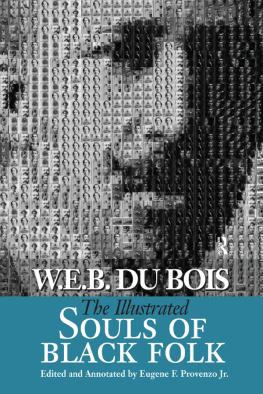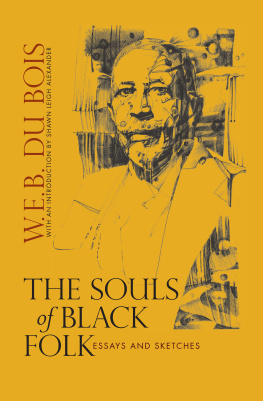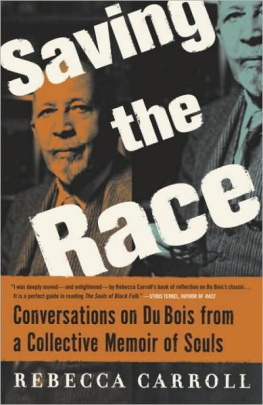Du Bois William Edward Burghardt - The souls of Black folk
Here you can read online Du Bois William Edward Burghardt - The souls of Black folk full text of the book (entire story) in english for free. Download pdf and epub, get meaning, cover and reviews about this ebook. City: UK;Old Saybrook;Conn, year: 2008;2007, publisher: Oxford University Press;Tantor Media, genre: Romance novel. Description of the work, (preface) as well as reviews are available. Best literature library LitArk.com created for fans of good reading and offers a wide selection of genres:
Romance novel
Science fiction
Adventure
Detective
Science
History
Home and family
Prose
Art
Politics
Computer
Non-fiction
Religion
Business
Children
Humor
Choose a favorite category and find really read worthwhile books. Enjoy immersion in the world of imagination, feel the emotions of the characters or learn something new for yourself, make an fascinating discovery.

- Book:The souls of Black folk
- Author:
- Publisher:Oxford University Press;Tantor Media
- Genre:
- Year:2008;2007
- City:UK;Old Saybrook;Conn
- Rating:5 / 5
- Favourites:Add to favourites
- Your mark:
- 100
- 1
- 2
- 3
- 4
- 5
The souls of Black folk: summary, description and annotation
We offer to read an annotation, description, summary or preface (depends on what the author of the book "The souls of Black folk" wrote himself). If you haven't found the necessary information about the book — write in the comments, we will try to find it.
The souls of Black folk — read online for free the complete book (whole text) full work
Below is the text of the book, divided by pages. System saving the place of the last page read, allows you to conveniently read the book "The souls of Black folk" online for free, without having to search again every time where you left off. Put a bookmark, and you can go to the page where you finished reading at any time.
Font size:
Interval:
Bookmark:
OXFORD WORLDS CLASSICS
THE SOULS OF BLACK FOLK
W. E. B. DU BOIS was born in Great Barrington, Massachusetts, on 23 February 1868. In 1885 he went to Fisk University where he edited the Fisk Herald. After graduating in June 1888 he continued his studies at Harvard College, gaining an MA degree in history in 1891. Following further study at the Friedrich Wilhelm University in Berlin, he returned to the United States in 1894 to take a teaching position in classics at Wilberforce University in Xenia, Ohio. Du Bois became the first black to receive his Ph.D. from Harvard in 1895 and moved to Philadelphia the next year to pursue a sociological study of black life there. After accepting a faculty position in economics and history at Atlanta University, he gained renown as an intellectual in the next decade with the publication of The Souls of Black Folk (1903) and his participation in the Niagara Movement, a group of black leaders assembled in 1905 to promote full civil and economic rights for blacks. In 1910 Du Bois moved to New York, where he accepted a position at the National Association for the Advancement of Colored People (NAACP) as the editor of the civil rights organizations monthly journal, The Crisis. In February 1919 in Paris, Du Bois organized the First Pan-African Congress, which gathered delegates from the United States, the Caribbean, Europe, and Africa. He continued to publish a steady stream of important books, including Darkwater (1920), Dark Princess (1928), and Black Reconstruction (1935). After a series of political conflicts, Du Bois resigned from The Crisis in 1934 and returned to Atlanta University, where he founded and edited another journal, Phylon. Increasingly radical in his public criticism of US foreign policy and race relations after the Second World War, Du Bois worked with pacifist organizations and the Council on African Affairs. After celebrating his ninetieth birthday in New York, Du Bois toured Europe, the Soviet Union, and China in 1958 and 1959. In 1961 he accepted the invitation of Kwame Nkrumah, the president of independent Ghana, to move to Africa. Du Bois died in Ghana on 27 August 1963, on the eve of the monumental civil rights protest march in Washington, DC.
BRENT HAYES EDWARDS is an associate professor in the Department of English at Rutgers University. He is the author of The Practice of Diaspora: Literature, Translation, and the Rise of Black Internationalism (2003), the co-editor of the essay collection Uptown Conversation: The New Jazz Studies (2004), and the editor of Joseph Conrads Nostromo (2004) and Frederick Douglasss My Bondage and My Freedom (2005).
OXFORD WORLDS CLASSICS
For over 100 years Oxford Worlds Classics have brought readers closer to the worlds great literature. Now with over 700 titlesfrom the 4,000-year-old myths of Mesopotamia to the twentieth centurys greatest novelsthe series makes available lesser-known as well as celebrated writing.
The pocket-sized hardbacks of the early years contained introductions by Virginia Woolf, T. S. Eliot, Graham Greene, and other literary figures which enriched the experience of reading. Today the series is recognized for its fine scholarship and reliability in texts that span world literature, drama and poetry, religion, philosophy and politics. Each edition includes perceptive commentary and essential background information to meet the changing needs of readers.
Refer to the to navigate through the material in this Oxford Worlds Classics ebook. Use the asterisks (*) throughout the text to access the hyperlinked Explanatory Notes.
OXFORD WORLDS CLASSICS

W. E. B. DU BOIS

Edited with an Introduction and Notes by
BRENT HAYES EDWARDS


Great Clarendon Street, Oxford OX2 6DP
Oxford University Press is a department of the University of Oxford.
It furthers the Universitys objective of excellence in research, scholarship,
and education by publishing worldwide in
Oxford New York
Auckland Cape Town Dar es Salaam Hong Kong Karachi
Kuala Lumpur Madrid Melbourne Mexico City Nairobi
New Delhi Shanghai Taipei Toronto
With offices in
Argentina Austria Brazil Chile Czech Republic France Greece
Guatemala Hungary Italy Japan Poland Portugal Singapore
South Korea Switzerland Thailand Turkey Ukraine Vietnam
Oxford is a registered trade mark of Oxford University Press
in the UK and in certain other countries
Published in the United States
by Oxford University Press Inc., New York
Editorial material Brent Hayes Edwards 2007
The moral rights of the author have been asserted
Database right Oxford University Press (maker)
First published as an Oxford Worlds Classics paperback 2007
All rights reserved. No part of this publication may be reproduced, stored in a retrieval system, or transmitted, in any form or by any means, without the prior permission in writing of Oxford University Press, or as expressly permitted by law, or under terms agreed with the appropriate reprographics rights organization. Enquiries concerning reproduction outside the scope of the above should be sent to the Rights Department, Oxford University Press, at the address above
You must not circulate this book in any other binding or cover
and you must impose this same condition on any acquirer
British Library Cataloguing in Publication Data
Data available
Library of Congress Cataloging in Publication Data
Du Bois, W. E. B. (William Edward Burghardt), 1868-1963.
The souls of Black folk / W. E. B. Du Bois ; edited with an
introduction and notes by Brent Hayes Edwards.
p. cm. (Oxford worlds classics paperback)
Includes bibliographical references.
ISBN 9780192806789 (pbk. : alk. paper) 1. African Americans.
I. Edwards, Brent Hayes. II. Title.
E185.6.D797 2007
973.0496073dc22
ISBN 9780192806789
1 3 5 7 9 10 8 6 4 2
Typeset in Ehrhardt
by RefineCatch Limited, Bungay, Suffolk
Printed in Great Britain
on acid-free paper by
Clays Ltd., St Ives plc.
SINCE its publication in April 1903, The Souls of Black Folk has justifiably been celebrated as the definitive text of the African American literary tradition. A seemingly modest collection of fourteen pieces framed by a preface and afterword, the book made an immediate impact on American political debate, erupting with the sudden brilliance of fireworks going off in a cemetery. It is one of the very rare books that marks the threshold of its historical era (the dawning of the Twentieth Century, to use Du Boiss phrase), both by articulating the political demands, cultural accomplishments, and spiritual strivings of an entire people, and at the same time by setting the definitive terms of debate for a national dialogue about the significance of race in the lingering aftermath of the slave trade.
By the time The Souls of Black Folk was published, Du Bois had already achieved recognition as one of the leading lights of the African American intellectual elite at the turn of the century. Born in 1868 in Great Barrington, Massachusetts, he had studied at Fisk, the black college in Nashville, Tennessee, before pursuing a second BA and an MA degree at Harvard, where he worked with some of the most important scholars of the time, including Frank Taussig in economics, Albert Bushnell Hart in history, and William James and George Santayana in philosophy. Du Bois continued his graduate work on fellowship at the Friedrich Wilhelm University in Berlin, returning to the United States to become the first African American to receive a Ph.D. from Harvard in 1895. During the next seven years, Du Bois held three teaching positions (at Wilberforce University in Ohio, the University of Pennsylvania, and Atlanta University), and established himself as an energetic and gifted scholar with the publication of his doctoral thesis,
Next pageFont size:
Interval:
Bookmark:
Similar books «The souls of Black folk»
Look at similar books to The souls of Black folk. We have selected literature similar in name and meaning in the hope of providing readers with more options to find new, interesting, not yet read works.
Discussion, reviews of the book The souls of Black folk and just readers' own opinions. Leave your comments, write what you think about the work, its meaning or the main characters. Specify what exactly you liked and what you didn't like, and why you think so.

